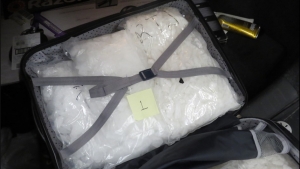Press Release
Former Mexican lawyer who became major methamphetamine supplier to drug trafficking organization sentenced to more than seven years in prison
For Immediate Release
U.S. Attorney's Office, Western District of Washington
Defendant claims he turned to drug dealing when economy stalled during the pandemic – Was supplier to ring connected to Aryan Family prison gang
Tacoma – A former attorney from Mexico was sentenced June 21, 2024, to 90 months in prison for conspiracy to distribute controlled substances, announced U.S. Attorney Tessa M. Gorman. Gustavo Castellanos-Tapia, 38, of Burien, Washington, was a significant supplier of methamphetamine to the drug trafficking organization with ties to the prison gang known as the “Aryan Family.” In imposing the sentence, Chief U.S. District Judge David G. Estudillo rejected arguments from the defense the Castellanos-Tapia played a minor role in the drug ring.
Gustavo Castellanos-Tapia was identified as a significant supplier of methamphetamine to the drug trafficking organization. Law enforcement had

Castellanos-Tapia under surveillance and learned that he would deliver suitcases full of methamphetamine—some 30-40 pounds at a time—every few weeks.
Unlike some drug ring participants who become involved to feed their addiction, Castellanos-Tapia was not a drug user. In fact, he previously worked as a lawyer in Mexico and came to the U.S. in 2020 when the pandemic stalled the economy. He obtained work as a boat painter but got into drug dealing to increase his income.
Castellanos-Tapia and 23 other defendants were indicted and arrested in March 2023. Over the course of the investigation, agents seized from members of the drug trafficking organization an estimated 255 pounds of methamphetamine, an estimated 830,000 fentanyl pills, more than 26 pounds of fentanyl powder, cocaine, six pounds of heroin, $668,000 of suspected drug proceeds, and 225 firearms.
In asking for a nine-year prison sentence, prosecutors pointed out that despite a small decrease in overdose deaths nationwide, Washington had an increase in overdose deaths of over 27% in the year ending December 2023. “Drugs like the methamphetamine that Castellanos-Tapia distributed have a devastating impact on the community,” prosecutors wrote. “Users of these drugs frequently resort to stealing—from family members, friends, and complete strangers—to feed their addictions. No doubt, drug users are responsible for a large percentage of these crimes, as well as the violent crimes, in our communities.”
Because Castellanos-Tapia was not legally present in the United States he likely will be deported following his prison term.
This case is part of an Organized Crime Drug Enforcement Task Forces (OCDETF) investigation. OCDETF identifies, disrupts, and dismantles the highest-level drug traffickers, money launderers, gangs, and transnational criminal organizations that threaten the United States by using a prosecutor-led, intelligence-driven, multi-agency approach that leverages the strengths of federal, state, and local law enforcement agencies against criminal networks.
This investigation was led by the FBI with critical investigative teamwork from the Drug Enforcement Administration (DEA), Homeland Security Investigations (HSI), the Washington State Department of Corrections, with significant local assistance from the Tacoma Police Department, Pierce County Sheriff’s Office, and the Thurston County Narcotics Task Force, led by the Thurston County Sheriff’s Office. Throughout this investigation the following agencies assisted the primary investigators: Washington State Patrol, Customs and Border Protection Air and Marine, Lewis County Sheriff’s Office, Lakewood Police Department, and U.S. Postal Inspection Service (USPIS).
The case is being prosecuted by Assistant United States Attorneys Max Shiner and Zach Dillon.
The case is U.S. v Castellanos-Tapia CR23-5085
Contact
Press contact for the U.S. Attorney’s Office is Communications Director Emily Langlie at (206) 553-4110 or Emily.Langlie@usdoj.gov.
Updated June 24, 2024
Topics
Drug Trafficking
Opioids
Violent Crime
Component

 U.S. Department
of Justice
U.S. Department
of Justice